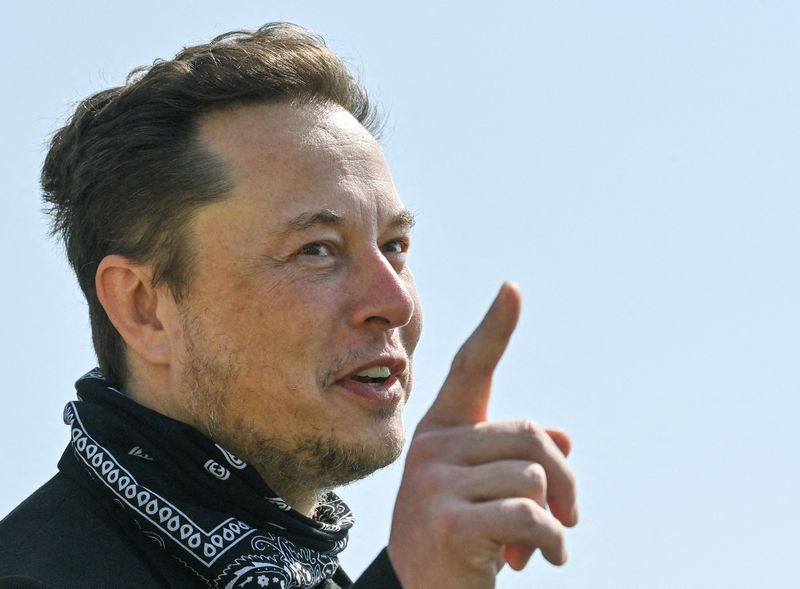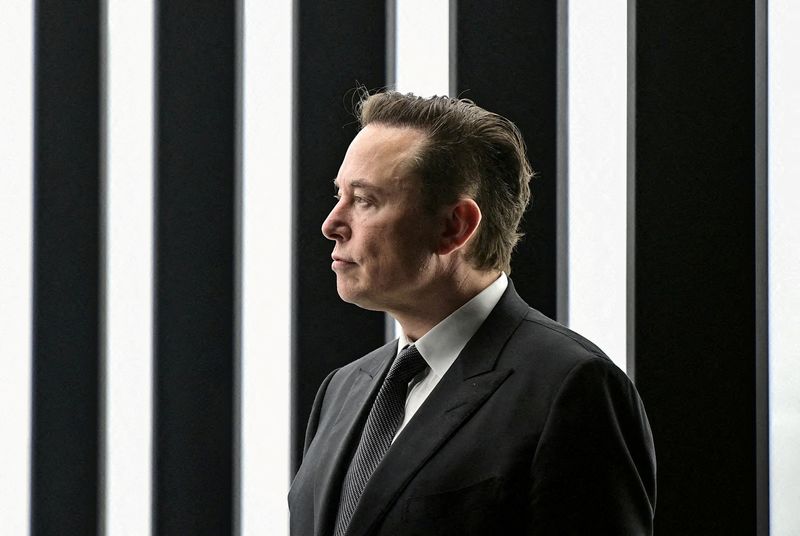By Abinaya V and Nivedita Balu
(Reuters) -Tesla Inc Chief Executive Elon Musk disclosed on Monday he had abandoned a plan to join Twitter Inc (NYSE:TWTR)'s board just as his tenure was about to start, the latest move by the world's richest man that defied corporate America's norms.
Musk revealed last week he had accepted a board seat at Twitter, contradicting a regulatory filing he had published a day earlier in which he described himself as a passive investor.
Sources told Reuters at the time that Musk asked Twitter for a board seat weeks before the social media company agreed to the arrangement.
Musk and Twitter did not disclose the reason for the u-turn. Musk said in a regulatory filing on Monday he could now increase his 9.1% stake in Twitter or push the company to pursue transactions, even though he has no such plans at this time.
There was no sign that Twitter was worried that a hostile bid from Musk was imminent. In announcing the development, Twitter disclosed no shareholder rights plan, known as a "poison pill," that would force dilution if Musk tried to raise his stake above a certain threshold.
However, Twitter Chief Executive Parag Agrawal warned Twitter employees in a tweet on Sunday of "distractions ahead," a possible reference to Musk's criticism of the company through tweets. He added that he believed Musk's withdrawal was "for the best."
A Twitter spokesperson did not respond to a request for comment.
Twitter shares were up 2.6% at $47.48 in afternoon trading in New York on Monday. They are up more than 20% since Musk disclosed his stake in Twitter on April 4. Wall Street analysts say Musk's involvement attracted legions of retail investors to the stock.
Securities experts have pointed out that by delaying and mischaracterizing the disclosure of his stake in Twitter, Musk bought the shares more cheaply, saving himself $143 million by one estimate. It is unclear whether this would be a consideration for Musk, whose net worth is pegged by Forbes at $274 billion.
Musk could not be reached for comment.
Musk deleted on Monday many of the tweets he posted over the weekend about the social media platform. It was not clear what prompted the move. The tweets ranged from a call to remove advertising on Twitter to dropping the letter "w" in the social media company's name.
Jacob Frenkel, a former enforcement attorney at the U.S. Securities and Exchange Commission (SEC), said Musk's reversal was unconventional but did not appear to violate any rules.
"Merely being extended an offer to join the offer to board, contemplating doing so and deciding not to is not a violation of securities laws," said Frenkel.
A spokesperson for the SEC declined to comment.
Other experts pointed out that Musk's public criticism of Twitter would have been difficult to reconcile with his fiduciary duties as a board director.
"Once on the board, most people, including activist shareholders, traditionally don't talk publicly," said Gregory Taxin, managing director of activist investor advisory firm Spotlight Advisors.
'FUNDING SECURED'
It is not the first time that Musk performed a high-profile U-turn. In 2018, he tweeted that there was "funding secured" for a $72-billion deal to take Tesla (NASDAQ:TSLA) private, but did not move ahead with an offer.
He and Tesla each paid $20 million civil fines, and Musk stepped down as Tesla's chairman to resolve SEC claims that Musk defrauded investors. Musk has since challenged an agreement he entered into with the SEC for some of his tweets to be vetted by a lawyer.
Securities experts have also questioned Musk's compliance with his arrangement with the SEC. In early November, Musk posted on Twitter that he would offload 10% of his Tesla stake if users approved. A majority did, and the poll sent Tesla shares into a slump. Musk has since sold $16.4 billion of Tesla stock.
News of Musk taking a board seat last week had some Twitter employees panicking over the future of the social media company's ability to moderate content, company sources told Reuters.
Charles Elson, founding director at the Weinberg Center for Corporate Governance, said Tesla, an electric car marker, and SpaceX, a space rocket developer, were already keeping Musk very busy, and he would have had little time to contribute to Twitter meaningfully as a board director.

"The shareholders of Tesla should be quite concerned about his involvement here because it simply takes time and energy away from his primary venture," Elson said.
A Tesla spokesperson did not respond to a request for comment.
